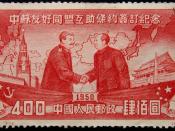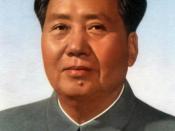Weakened by imperialism at the end of the twentieth century, control of China's massive size became an increasingly difficult task for it's monarchial government to undertake. Western conflict spurred exponential increases in political philosophy and technological advancement, while China's peasant populace remained politically powerless. China's lack of involvement left it's government struggling to maintain a foothold on the security of it's borders and economy while also maintaining it's more than 4,000 year old culture. The Chinese government feared Westernization for in the midst of Europe's many political revolutions, the magnitude of authoritative instability it caused was quite evident (DeLuca 31-32). Today China remains the largest single functioning nation in the world. The reality of this statement lies almost wholly in the hands of China's greatest political visionary and activist, Mao Zedong.
Born on December 26, 1893 and reared in Hunan as the son of a peasant farmer, Mao Zedong had little means of contact with the political world in his youth (DeLuca 32).
Zedong gained his earliest influences from interaction with his parents, for media like newspapers or telephones were rare (Pye 113). Unlike generations before, Western literature was of growing importance to liberal Chinese school curricula, a notion Zedong's father couldn't bare (Pye 118). Despite this "opposition", Zedong joined directive forces with his mother and gained entrance to Hunan Normal School. Whereas his contact with dynamic Western thought was minimal during his earlier childhood, Mao became fascinated with newspapers and biographies of famous political leaders. While still a student, Zedong excited with change in the Chinese government joined the military to overthrow the oppressive Manchu dynasty in 1912 and reestablish China as a Nationalist Republic with Sun Yat-sen as it's president (DeLuca 32). Springing from the Chinese revolution was a sense of change in the mind of Zedong, which...



Good Essay
This essay contains a reasonable amount of factual information. However, there is some unwanted repetition. Overall, this is a well written essay.
1 out of 1 people found this comment useful.